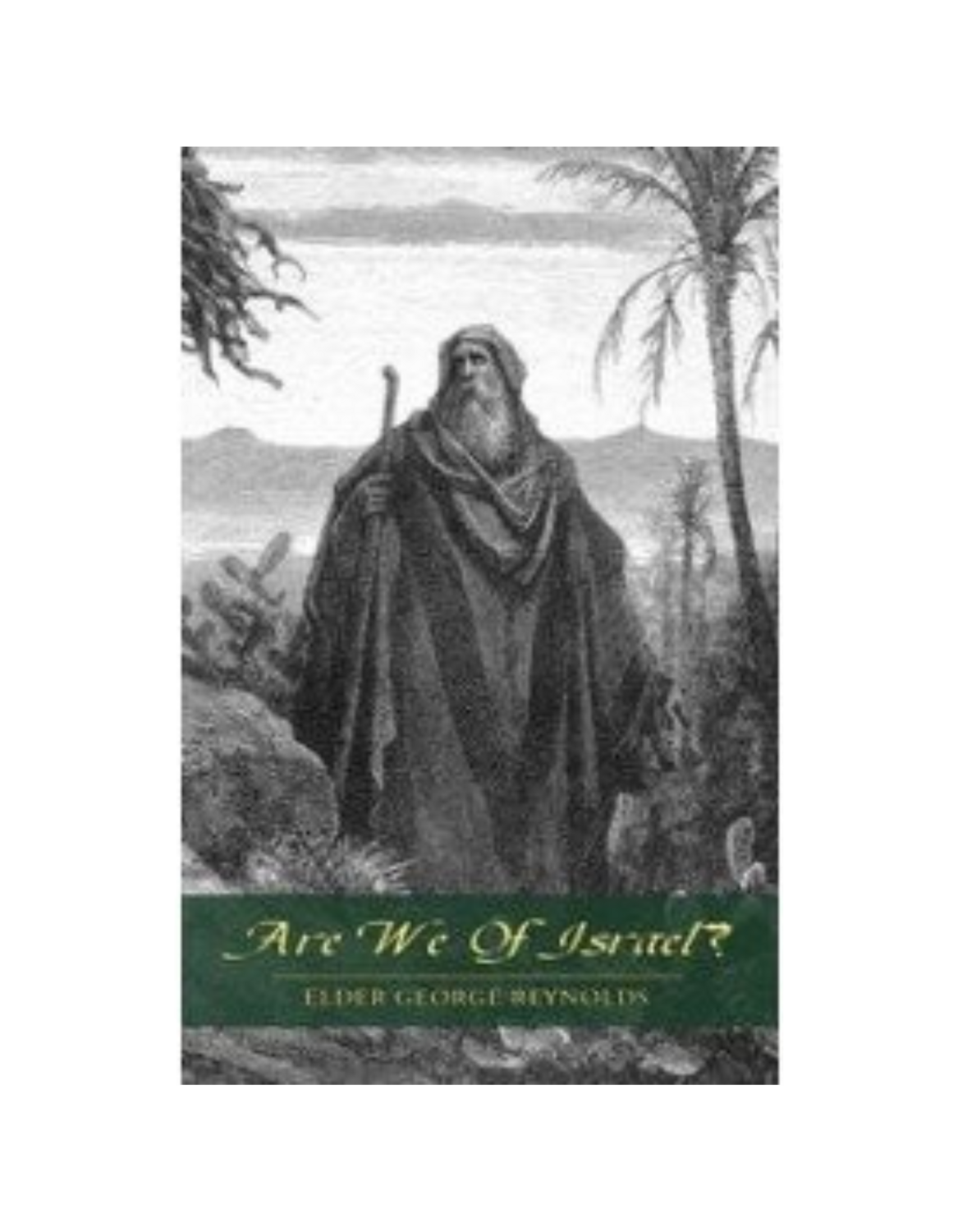Are We of Israel? (1895)
In this book, Elder Reynolds examines the premise of Israel being scattered throughout the world; its historical verification; ancient and modern-day prophecies of Israel; and several legends and myths of other countries supporting the infiltration of Israel into settlements and foreign governments. He researches and proposes several interesting ideas which are as applicable toward understanding the roles of the descendants of Israel today as they were in 1895. 56 pages
Reviewed by Colby Townsend for the Association for Mormon Letters: George Reynolds is one of those names in Mormon history that you hear about every once in a great while but that popular and mainstream Mormon history has all but forgotten. Reynolds was responsible for some of the most important studies and events nearer the end of the 19th century and beginning of the 20th century, but he is rarely ever mentioned in our discussions today. He was responsible for the massive A Complete Concordance of the Book of Mormon, [1] which turned out to be one of the most important works for studying the text of the Book of Mormon. He was also responsible for: the first commentary on the Book of Mormon, The Story of the Book of Mormon; [2] A Dictionary of the Book of Mormon; [3] one of the first studies exploring the dependence (or lack thereof) of the Book of Mormon on Solomon Spauling's manuscript; [4] an early study on the Book of Abraham entitled The Book of Abraham: Its Authenticity Established as a Divine and Ancient Record; [5] and 463 articles in different LDS Church periodicals over his lifetime. [6] He was a giant of a man in the world of LDS publications during his lifetime, and to have a grasp on late 19th and early 20th century Mormon understandings of themselves, the world, and the history of the Bible, it is important to survey the writings of George Reynolds. [7] Archive publishers has been reprinting out of print and rare LDS books for many years now. They have done a great service in providing these old books for our modern consumption at great prices. I first found out about Archive Publishers while serving a mission in Raleigh, North Carolina. The store near the Raleigh temple had many of Archive's titles, and I was able to pick up a couple while there. I was always fascinated by the different titles and couldn't wait for the day when I would actually be able to read the titles and become more familiar with them. This title specifically has been reproduced very well, which can be a concern when purchasing books that are simply reprinted from older copies. The buyer wonders whether or not he or she will be able to read every page, and with this one they can. Reynolds surveys what he considered the scholarship of his day and brings the Latter-day Saint reader, his intended audience, up to speed on what was being said at the time. There were European scholars in the 17th to late 19th century who argued that most of Britain descended from Israelite ancestry. [8] Mary Baker Eddy, the founder of the Christian Science movement, also became involved in the movement about the time that Reynolds' book was printed. [9] There are small groups that still hold to this belief. Some of the basic arguments of this movement that Reynolds provides are the similarities "that existed between the laws, manners, customs, etc., of the ancient inhabitants of [Europe's] northern and northwestern portions and those of ancient Israel." [10] This is a funny argument when only a few lines later he states, "through the ignorance of historians, disguised under other names, they had remained unknown the until present time, their habits, customs, traditions, etc., having in the meanwhile become so greatly changed by time and circumstance, as to render them unrecognizable at this late day." [11] It is unclear how one can make these two statements in tandem with each other. On the one hand, it is obvious to these scholars that the northwestern Europeans are descendants due to some of the ancient groups' ways, laws, and manners, but at the same time their manners had changed so drastically that it is unrecognizable by historians in the late 19th century. These scholars also claimed that since the Israelites were located "on the Mediterranean Sea [the location] admirably adapted its people for [maritime] pursuit." The argument is based off location and therefore supposed practice. The only evidence that Reynolds cites is Judges 5:17, which has Deborah and Barak complaining against Dan that they did not assist Israel with fighting Sisera and his hosts. The fact that Europe is (at least somewhat north-northwest) was an important theological point for these scholars, and especially for George Reynolds. Jeremiah 23:8 states that "The Lord...which brought up and which led the seed of the house of Israel out of the north country, and from all countries whither I had driven them; and they shall dwell in their own land." Joseph Smith, in a revelation of 1831, stated that "they who are in the north countries shall come in remembrance before the Lord; and their prophets shall hear his voice..." [12] Reynolds utilizes this text to state, "a large portion of [the tribe of Ephraim], had at some period of his history, separated from the rest of the tribes of Israel, and at the time of this restitution was to dwell in a land far from the north country in which the residue were hidden. These tribes are to have the frozen barriers of the north melted, so that the ice shall flow down, then a highway is to be cast up for them, in the midst of the great deep, next they cross the barren deserts and a thirsty land and eventually arrive with their rich treasures at the home of Ephraim..." [13] Although today almost no LDS group or thinker would accept the conclusions presented by George Reynolds, or his scholarly friends of the late 19th century, these are important concepts in the history of Mormon thought. It is natural that Reynolds and others in the church at the time would turn to these kinds of interpretations. Britain, the land from which Reynolds himself hailed, was probably the most receptive country to the gospel in the 19th century. It was as if the Americans were the Jews of the New Testament and the British were the Gentiles. Missionary work was not very successful until Joseph Smith began sending missionaries to Britain. Naturally, they would be seen as part of God's chosen and beloved people, not only spiritually, but through descent. The ideal audience for this title might not be academic, as Reynolds' scholarship is well out of date by now and mostly unconvincing, but I think that scholars studying the history of beliefs and trends in Mormonism should turn to this book; there is not much like it from its time period in Mormonism. Theologically, laypeople can and will find much here to mine for their spiritual needs, and will have fun doing it. Many wonder about the lost tribes, volumes upon volumes have been written, and countless hours have been spent in Sunday School classes discussing and debating different ways of understanding the lost tribes in Mormon thought. For anyone in or outside of the LDS church with a remote interest in this topic, [14] this will be a fascinating read, and it comes highly recommended by this reviewer. Footnotes: [1] Reynolds, A Complete Concordance of the Book of Mormon (Salt Lake City: Deseret Book, 1900). [2] Reynolds, The Story of the Book of Mormon (Salt Lake City: Jos. Hyrum Parry, 1888). [3] Reynolds, A Dictionary of the Book of Mormon (Salt Lake City: Jos. Hyrum Parry, 1891). [4] Reynolds, The Myth of the "Manuscript Found": Or the Absurdities of the "Spaulding Story" (Salt Lake City: Juvenile Instructor Office, 1883). [5] Reynolds, The Book of Abraham: Its Authenticity Established as a Divine and Ancient Record: With Copious References to Ancient and Modern Authorities (Salt Lake City: Deseret News Printing & Publishing, 1879). [6] His biographer, Bruce A. Van Orden, said of Reynolds that he was "one of the most influential people in the Church" during his lifetime. See Van Orden, Prisoner for Conscience' Sake: The Life of George Reynolds (Salt Lake City: Deseret Book, 1992), vii. [7] I have to be honest that I am biased with George Reynolds because he is the 4th great-grandfather of my wife. His granddaughter, my wife's great grandmother, is still living, so George Reynolds comes up in discussions at family events and I think he is a fascinating character in Mormon history. [8] Colonel Garnier, Israel in Britain: A Brief Statement of the Evidences in proof of the Israelitish Origin of the British Race (London: Robert Banks & Son, 1890). [9] Michael Barkun, Religion and the Racist Right: The Origins of the Christian Identity Movement (USA: University of North Carolina Press, 1997), 26-28. [10] Reynolds, Are We Of Israel?, 13-14. [11] Reynolds, op. cit., 14. [12] Doctrine and Covenants 133:26 (LDS edition). [13] Reynolds, op. cit., 43. [14] The current form this discussion has taken today is that of neo-Jewish groups in sub-saharan Africa, India, Madagascar, among other places, that claim lost tribe status. The Israeli Rabbinate has only recognized one group, the Bnei Manashe tribe, as a legitimate lost tribe (see http://www.bbc.co.uk/news/world-middle-east-20842135). This is a very controversial issue and represents where the discussion has moved since the end of the 19th century.
| ISBN | 9781930679191 |
|---|---|
| Author | George Reynolds |
| Age Group | 12-18 |
| Book Type | paperback |

